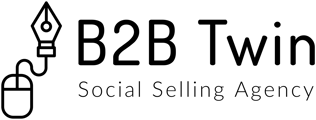Habits that ensure success in B2B social selling
Sustainable habits matter in B2B social selling because they build trust with clients and prospects.
SOCIAL MEDIASOCIAL SELLINGSALES


Picture this.
You’re scrolling through your social media feed when an ad promotes a product or service that aligns with your needs. You click on it, intrigued by what you see, and before you know it, you’ve made a purchase.
That’s the power of B2B social selling – tapping into the right audience at the right time and converting leads into loyal customers. But how can businesses sustain this success in an ever-changing digital landscape?
This article will explore effective strategies and practical tips to help you navigate the world of B2B social selling and create habits that will propel your business forward.
The importance of sustainable habits in B2B social selling
In the fast-paced world of B2B social selling, it's easy to get caught up in pursuing short-term gains and quick wins. However, a sustainable approach to your habits and strategies is crucial for long-term success. Sustainable practices in B2B social selling benefit you and your business and contribute to a healthier and more responsible industry.
Sustainable habits matter in B2B social selling because they build trust with clients and prospects. In an era where consumers are conscious about their purchasing decisions’ environmental and ethical impact, demonstrating your commitment to sustainability can make all the difference. By incorporating sustainable practices into your sales process, such as using eco-friendly materials or promoting responsible products, you cater to existing market demands and attract new customers who align with these values.
Another aspect of sustainable habits in B2B social selling is their potential for driving innovation. By seeking more sustainable ways of doing business, you open yourself up to new ideas, technologies, and partnerships that can lead to better outcomes for both profit and the planet. Embracing sustainability challenges traditional mindsets and encourages creative thinking about how we can reshape our industries for a brighter future. This continuous drive towards improvement positions your business ahead of competitors, who may still be stuck in outdated practices.
We foster responsible business practices and create opportunities by adopting sustainable habits in B2B social selling.
Understanding the buyer’s journey and needs
Understanding the buyer’s journey and needs is fundamental to successful B2B social selling. Understanding your target audience’s pain points and challenges is crucial to selling to businesses. By conducting thorough market research and asking the right questions, you can gain valuable insights into what motivates your prospects to make purchasing decisions.
In today’s competitive landscape, buyers are empowered with more information than ever. They conduct extensive research online, read reviews, and seek recommendations from their peers. This means that sales professionals must be prepared to meet potential clients at various stages of their buying journey. Developing a deep understanding of your buyer persona allows you to tailor your messaging and approach based on where they are in the decision-making process.
It is essential to recognize that buyers’ needs evolve. As businesses grow and face new challenges, their priorities shift accordingly. Building strong client relationships involves adapting your selling strategies as their needs change. By listening and staying informed about industry trends and developments, you can position yourself as a trusted advisor who understands their evolving requirements.
In conclusion, understanding the buyer’s journey and needs is a continuous process that requires ongoing research and adaptability. By empathizing with your target audience’s pain points, tailoring your messaging, and staying informed about changes in their priorities, you can develop sustainable habits that ensure continued success in B2B social selling.
Leveraging content marketing for long-term results
One strategy businesses can implement for long-term success in B2B social selling is leveraging content marketing. Content marketing allows businesses to establish themselves as an industry thought leader, build trust with their target audience and nurture leads throughout the buyer’s journey. By creating high-quality and valuable content such as blog posts, ebooks, videos, or podcasts, businesses can position themselves as experts in their field and keep their audience engaged.
The beauty of content marketing lies in its longevity. Unlike paid advertising campaigns that have a short lifespan, great content has the potential to generate organic traffic and engagement for years to come. Businesses can ensure a continuous flow of leads by investing time and resources into developing evergreen content that remains relevant regardless of trends or changes.
Leveraging various distribution channels, such as social media platforms, email newsletters, or guest blogging opportunities, can amplify the reach of your content marketing efforts. This helps attract new prospects, reinforces your brand presence among existing customers, and fosters customer loyalty.
A solid content marketing strategy is essential to sustainable B2B social selling practices. By providing valuable content that informs and engages your target audience, you will establish yourself as an authority in your industry and lay the foundation for long-term success by nurturing leads and generating organic traffic through evergreen assets.
Building and nurturing relationships with prospects
Building and nurturing relationships with prospects is crucial to successful B2B social selling. While focusing on closing deals may tempt, neglecting relationship-building can lead to missed opportunities and lost sales in the long run. Understanding your prospects’ needs, challenges, and goals can enhance your ability to provide value and build trust.
One key strategy for building relationships with prospects is personalized outreach. Instead of sending generic messages or cold emails, take the time to research your prospects and tailor your communication. Show genuine interest by referencing specific information from their website or recent news articles about their industry. This personalized approach shows that you have taken the time to understand their business, increasing the chances of receiving a positive response.
Another aspect of relationship-building is consistent follow-up. Don’t rely on initial interactions; stay engaged with your prospects. Regular check-ins or sharing relevant content via email or social media can help keep your top-of-mind and show that you are invested in their success. Building these ongoing connections lays the groundwork for future collaborations and positions you as a trusted advisor rather than another salesperson.
Building and nurturing relationships with prospects requires a proactive approach beyond focusing on closing deals. Personalized outreach and consistent follow-up show an understanding of your prospect’s needs while positioning yourself as a reliable partner. Investing time into these relationship-building efforts increases the likelihood of long-term success.
Consistent tracking and analysis of performance metrics
Consistent tracking and analysis of performance metrics is a fundamental aspect of achieving success in B2B social selling. It allows sellers to gain valuable insights into their performance, identify areas for improvement, and make data-driven decisions to drive better results. By monitoring metrics, such as customer engagement, conversion rates, and revenue generated per campaign, sales professionals can assess the effectiveness of their social selling strategies.
Reviewing historical data enables sellers to identify patterns and spot any significant deviations requiring attention or change. For example, noticing a decline in engagement with a specific type of content could prompt sellers to reassess its relevance or experiment with new formats. With these insights, sales professionals can refine their social selling tactics for maximum impact.
Tracking performance metrics helps measure the effectiveness of channels and platforms for B2B social selling efforts. It provides sellers with an understanding of which channels are generating the most leads or driving the highest conversions. This knowledge empowers them to allocate resources and focus on the platforms that yield the best outcomes for their target audience.
Consistent tracking and analysis of performance metrics enhances decision-making capabilities and encourages continuous improvement in B2B social selling practices. Sellers prioritizing data-driven approaches will probably see tremendous success in attracting prospects, nurturing client relationships, and closing deals.
Fostering a culture of continuous learning and improvement
In B2B social selling, where trends and technologies evolve, businesses must foster a culture of constant learning and improvement. This approach goes beyond attending training sessions or workshops; it encompasses a mindset that encourages employees to seek new knowledge and skills.
One of the fundamental benefits of fostering a culture of continuous learning is that it keeps your team ahead of the curve. By staying up-to-date with industry trends, emerging technologies, and best practices, your employees can identify new growth opportunities and adapt their strategies. This proactive approach not only boosts individual performance but also contributes to the success of your organization in an ever-changing marketplace.
Nurturing a culture of continuous learning empowers employees to take ownership of their professional development. When individuals realize they have the autonomy to explore new ideas, experiment with different approaches, and learn from their mistakes without fear of retribution, they become more engaged and motivated in their roles. As a result, they are more likely to generate innovative solutions and drive positive change within your business - propelling its continued success in B2B social selling.
Embracing sustainable habits for lasting success
Embracing sustainable habits is essential for lasting success in B2B social selling. While short-term gains may entice, the long-term approach sets apart successful sales professionals. Sales professionals can ensure continued career success by prioritizing ethical and sustainable practices, such as building strong customer relationships based on trust and transparency.
